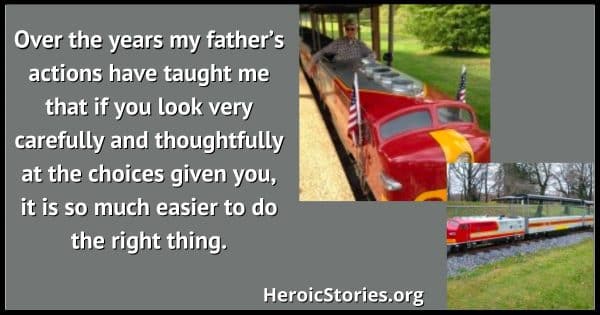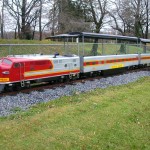by George Bartley
Indianapolis, Indiana, USA

In the 1950s, when I was six and my sister was three, my parents took us to Kinston, North Carolina, to see my aunt. While there, we visited the Kinston city park and their miniature amusement train. My father was fascinated by the setup. He was a railroad engineer, knew a great deal about amusement trains, and examined the train for hours. He began a conversation with the owner that went on all afternoon, the kind of conversation that only two diehard railroad enthusiasts could have. After a while, he came to my mother and told her he had just bought the train, which he planned to install in Gypsy Hill Park – the larger city park in Staunton, Virginia, where we lived. He told her that the Kinston owner wanted to sell the train, and only wanted $20,000. He added that he had seem similar models for sale for five times as much.
My mother was naturally horrified. Twenty thousand dollars was more than our house cost!
My father asked my sister and I if he should buy it. Of course we were jumping up and down – we thought this was the coolest thing ever!
My mother said, “Well, this is against my better judgment. I will support your decision, but I don’t agree with it at all.” After the train after was installed in Staunton, she drove it until her death — this at a time when driving a train was something that Southern ladies just did not do. Over the years, she became known in Staunton as the train lady and was beloved by thousands of children.
When the train first arrived in Staunton, a crew of railroad workers installed the quarter mile of track in the city park. Children who rode the train brought their own children years later, who would later bring their own children. When my father passed away, the flags in the city were flown at half mast.
Shortly before he died, I was talking with my father about the train, and he told me that during the 1950s, there was a separate city park for African Americans in Staunton, Virginia, and it definitely was not equal. One of the stipulations that the City Council (who administered the parks) had before the train could be operated was that the train would not sell tickets to (using the terminology of the day) Negroes. Since there was only one policeman in Gypsy Hill Park, the City Council did not want him to spend all his time chasing African Americans from the park.
My father was in an ethical quandary. He needed to keep it in Gypsy Hill Park, but he wanted to do the right thing. He agreed with the very conservative City Council so he’d be allowed to keep the train in the city park and make the money he needed to keep the train running. True to his word, he never sold a ticket to an African American child; he let them ride free! By following the rules of City Council, he was able to integrate the park.
Over the years, my father’s actions have taught me that if you look carefully and thoughtfully at the choices given you, it is so much easier to do the right thing.
Podcast: Play in new window | Download (Duration: 4:24 — 3.3MB)



I love the irony in this one. I’m laughing as I type this.
I loved this story, too, but instead of laughter, it touched me so much it brought tears to my eyes.
Too bad people who did the right thing in the Jim Crow south get so little publicity. Mr. Bartley, you had a good father. Great story.
George, I went to school with you and your sister at Riverheads. My wife and I are volunteers with the Gypsy Express. Thank-you and your family for bring the train to Staunton. It brings joy to many, many children of all ages.
Wade Haislip
As is oft said, “Deeds and acts speak louder than ideas and words!” If only all persons could be such as your father, so generous and principled, what a wonderful world it could be.
This is my favorite story so far.
The father was a good man.
Well giving free tickets to a racial class is discrimination. Your father discriminated.
I have a couple of additional comments along this line. This was the simplest and the least offensive. The others will not appear here.
Was it discrimination? Absolutely. Was it wrong? In my opinion, absolutely not. It happened at a time where this kind of discrimination was how one man could make a difference, and how one man could be a quiet, yet effective, force for change. It took courage.
Yes–between right and wrong. But discrimination does not necessarily imply that one choice is superior to the other. It can simply be that one choice is more sensible than the other–which was eventually borne out.
I think the two different discriminations cancelled each other out. Good for this great man for doing what he did.
Loving hearts are all the same bright color.
Wow, that is awesome, what an inspiration your father is. Walt Disney loved trains, too, but he didn’t love children like this man did. We need more like him today!
What a great Dad!
I absolutely LOVE this. The people on the city council were probably furious — but he was EXACTLY following the rules!! What a great guy.
Yes, the City Council never expected anyone to NOT CHARGE for anyone’s ticket, so they didn’t say that the black children could not ride.
What a breath of fresh air! God bless him.
I salute your father as an inspiration to us all, however your mother is to be give credit as well. I have the feeling that had your mother put her foot down as too much of an expense, your father would not have persevered..
Brilliant and creative. I love it! And a real hero to keep to his principles regardless of the “bottom line”.
Great story, I hope that if I were in the same situation, I would make the same decision.
I respect and honor those who are able to be a beacon of change within the bounds of their culture. People are people; children are children. Imagine the memories those “forbidden” kids have to share with their children
Who doesn’t love trains of all sizes! It is still one of my favorite ways to travel ever since I was a nine year-old traveling with my eleven-year old sister in a steam train, the thousand miles across the South African landscape to boarding school. If one never gets to ride on a ‘big’ train, may every child get the chance to ride on a ‘little’ train, which your extraordinarily thoughtful father made possible down South. Thank you for sharing this wonderful story.